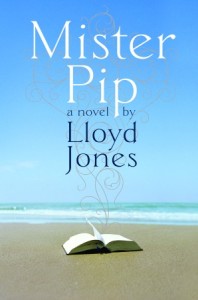I might be a little late to the party, but one of my nearest and dearest, the beloved Dr King has been repeatedly suggesting that I read Lloyd Jones’ Mr Pip for years. I finally did and what a read. I knew after the first few pages that Mr Pip was going to be a special book.

The novel is set in the early 1990s in the small South Pacific island country–Bougainville, during a civil war. The story surrounds the one white person, Mr Watt, who remains on the island and takes over the role of school teacher for the island children. With nothing but an old copy of Charles Dickens’ Great Expectations, Mr Watt, or Pop Eye as the children call him, reads one chapter to the class daily until the novel is finished. The Dickens classic transports the children and the villagers into Victorian England and out of their war torn country. Mr Pip draws attention not only to the power that literature yields and the countless places it can take us, but also, the timeless and universal themes Great Expectations explores. Things in the novel get a lot more complicated when the soldiers of Bougainville are determined to uncover the man known as Pip…
Mr Pip made me long to read Great Expectations again. The interpretation of the Dickensian characters through the eyes of the island children (and their parents) is brilliant. This book is a fast read, beautifully written with countless points of discussions for reading groups. It is unlike anything I have ever read and really is a great book. Just be warned–you may find yourself forced to dig out your old copy of Great Expectations as your next read…
Mr Pip discussion questions for your book club meeting:
1. Is it important that Mr. Watts is the last white man on the island? Why?
2. Why does Matilda write Pip’s name in the sand alongside the names of her relatives? Why does this upset her mother? How does this contribute to Dolores’s feelings about Mr. Watts’s instruction of her daughter? Are these feelings understandable?
3. Why do you think Mr. Watts pulled his wife in the cart? Why did he wear the red clown nose? What meaning did that have for them?
4. What is the message Matilda’s mother is trying to express to the children with the story of her mother’s braids? How is this related to the issue of Mr. Watts’s faith in God?
5. What did you think of the lessons that the mothers of the children bring to the classroom? If you were the parent of a child in Matilda’s class, what lesson would you teach the children? What might your mother have taught the class?
6. Who is Dolores warning the children about when she tells them the story about the devil lady and the church money? How does this story justify her actions regarding the book and the redskins? Do you agree with Dolores’s refusal to bring forth the book? With Matilda’s?
7. Where do you think Gilbert’s father takes Sam? How do you know? In your opinion, was it necessary that he do so?
8. Why does the corned beef in Mr. Watts’s house “represent a broad hope” for Matilda? Discuss Mr. Watts’s reaction to Matilda’s fragment. Do you believe that Grace was alive when Matilda arrived?
9. Discuss how the characters in this story struggle to reconcile the concepts of race and identity. Does it seem to dictate their interaction with each other? How does it influence their concepts of self? What moments, especially, helped reveal this to you?
10. What is the meaning of the story of the Queen of Sheba? Why does Mr. Watts bring it up? Why is it significant that Dolores is familiar with that story?
11. Why does Dolores step forward to declare herself “God’s witness” to the murder of Mr. Watts? Were you surprised that she did? Why does she insist that Matilda remain silent?
12. Do you think Matilda was able to return home? How would that outcome affect your reading of both novels?
13. Discuss your memorable experiences of being read to as a child. What book made the greatest impact on your life? Did any book come to you at precisely the right time, the way Great Expectations was brought to Matilda?
14. On Great Expectations and Mister Pip: Are both Mister Pip and Great Expectations universal coming-of-age tales? How did you react to the blending of these two distinctly different settings and time periods?
15. The initial lines of Great Expectations are reflected several times in this novel. Compare them to the opening lines of Mister Pip. What connections do these first sentences draw between the themes of both novels?
16. How is Dolores’s treatment of Matilda similar to Estella’s treatment of Pip in Great Expectations? How does this relationship help Matilda understand Pip’s attachment to Estella? Is it necessary that this attachment be severed before Pip/Matilda can grow individually?
17. What is signified by the changing of one’s name, both in Great Expectations and Mister Pip? Why does Matilda not change her name?
